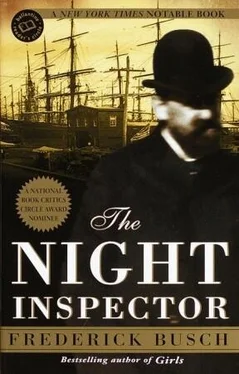“Who among us has dignity?” I asked him.
“Neither you nor I, I’d say offhand,” he said. “Did you hear that? Offhand? I’ve a lot to learn.”
“All of us, my friend.”
“All of us,” he said. “I’ll tell you when it’s gone dark.”
Mrs. Hess was as usual reserved, perhaps this evening even distant. I wondered if she sensed an embarrassment in me. I always valued her decorum. Her house, in Yorkville, was frequented by a various clientele, among them the boy called Mal, on whom a few of the older women doted. He was muscular and loud and, they said, at the moment of disrobing, shy. He had enlisted in the Guard and was sorrowful, they said he claimed again and again, not to have served, by dint of his youth, in the War.
“Then serve in this,” one of them repeated to a few of us, lounging in the parlor near dawn. “Do some active service here.” The tired, drunken women nodded, and the men laughed aloud. The peacekeeper and factotum, Delgado, dark of mien and dark of complexion, a sure, fierce fighter, circulated in silence. It was a noteworthy moment in that tasteful room of gentian-colored, textured wallpaper, and colored prints of parrots and doves, and it did not pass me by.
If Mrs. Hess was withdrawn, she was impossible to overlook, on account of her bulk, the jeweled tiaras with which she held her yellow-white hair in place, and the pallor of her marble flesh, not unassisted in this wise, I thought, by the quantities of laudanum she took in. Jessie, too, listened more than she spoke. Her skin was the color of lumber, say pine or spruce, washed with a tincture of creosote and slightly aged out of doors: browner than white and lighter than, say, beans of coffee in their burlap sacks. She was slender, tall, powerfully made, a mix perhaps of a female South Sea islander and African, and a man, she thought, who had been some Seminole, some white, and some Negro slave. Her limbs were long, the muscles of her calves looked always clenched, and when she moved her arms, the long muscles writhed.
Watching them once, I told her, “You have a separate life inside you.”
Beneath her breasts, such tender flesh, she was tattooed in small designs that she claimed were of significance to her and to her family. I could not decipher the figures, although I often pressed myself close enough to the place to trace the dark inscriptions on her darkness.
It is pathetically and laughably illogical that a man such as I would care, as I did, for such a woman. There were sufficient numbers of limbless, even faceless, men like me in Manhattan. Passersby regarded us with curiosity, with disquiet, with sorrow and pity and disgust. Men with pinned or flapping sleeves and men on crutches jerked and wobbled on Broadway. Men with specially fitted masks, with artificial jaws and gleaming ivory temple plates or metal cheekbones, swelled the crowds at Madison Square. I envied those who had visited the prosthetic specialists at Baltimore and had come away with more than a pasteboard mask. My wound, though it was closed, was always raw. The medicos claimed that the pain was mentally stimulated and the wound had healed. It was more than a wound, I’d replied. It was a topography, a climate and a landscape, a sculpture of furrows and hillocks, of gullies and caves and open field. I smelled it, some days — it made me think of pink roasted beef left for weeks in the cupboard and still, somehow, damp. When the air was cold, the mask bit. In humid weather, fluids dropped and collected, I thought, in a heavy, oil-like liquor. The doctors instructed me otherwise, and Jessie was emphatic in her own assessment contrary to mine. But they had never been able, at Baltimore, to fit me with an artificial face. I howled at them about my pain, complained that it grated on the bone. “He desires his anguish,” one of them said in disgust. I made a child’s rebellious face at him. But, looking at me, how could he have known?
In her fine room, on her broad bed, in the darkness I so appreciated, she moved me with her powerful thighs and bony shoulders, and she pinned me beneath her and held me still. She worked her lips and slow tongue on me, and I envisioned at such times — I always did, each time — her sad, light, greenish-brown Creole eyes. She climbed upon me, and then she reached above my head to the oval deal table beside the bed. Her breasts brushed my hair, and then she declined again, so that her chest and arms and belly and legs matched mine.
That stretching motion was always to turn up the lamp. It preceded by a moment the pulsing of her little pump against my loins, and then her low, soft voice: “Now take off the mask.”
I always did. And then we worked against each other, and then I worked within her, though never for terribly long, and then I arrived and so, I thought, or so she gave me to think, did Jessie. Each time, surprising myself, I realized, as if it were the first time, I wept and wept, and she held me as if I were her child.
Upon an evening soon again, I paid for the night, and I lay wrapped in bed linen as if it were a winding sheet, listening to Jessie as she read. The Methodists had taught her brilliantly; rather, I thought, she was brilliant, and she had been taught by someone literate. She wore a silk robe, figured, in white on a blue background, to represent the wings of moths, or mythical birds. Her radiantly black long hair she had put up in a kind of knotted ring at the back, and tendrils hung down beside her face, so that her head was naked and sheltered at once. A spike of tattooed figure peeked from her bosom at the margin of the robe, and Jessie peered at me, upon occasion, from within herself. And she read to me from a novel named St. Elmo , which breathlessly announced Miss Augusta Jane Evans’s discovery of human qualities in the poor and inhuman depravities in the wealthy.
“Jessie,” I said, “I beg your pardon for interrupting, for I love to hear you read. But am I wrong or is Miss Evans discovering that sunshine is hot and ice is cold?”
“Ice?” she said.
“I mean that this Evans discovers for us that those with wealth have got it through dint of effort, though it is perhaps cruelly applied, while the poor are … poor, Jessie.”
“Yes, they are. Then I’ll leave off, or read you something from the newspapers. I have procured The New York Times and The Evening Post . There’s a good deal about money in the headlines. The Union Pacific Railroad has paused in the building of track for want of something or other.”
“Funds,” I said. “Everything is funds.”
“And a credit something or other will be formed to do something else.”
“Build the road in return for railroad stocks.”
“And the losing of whichever is someone else’s profit, I assume.”
“You see, Jessie? I told you that anyone could understand the economy. You most of all, good heavens. You simply never cared.”
“And isn’t it peculiar,” she said, “that I, who am a commodity, have chosen to remain ignorant of what you call the marketplace?”
“The invisible marketplace. Yes.”
“Perhaps if I could see it,” she said, stretching. The tattoo moved because her bosom did, and I could look nowhere else. She did not turn toward me, but sat at the low green wicker table in a matching wicker chair, the lamp beside her, the book on her lap, and the window before her, its curtains adjusted so that she could watch the streets as she wished. Yet, not seeing me, she said, “But you can see it, can’t you, Bill?”
“You know that is not what I study at the moment.”
“You study me?”
“You know.”
She sat forward as if to look more closely at Eighty-sixth Street, hard by Third Avenue. And, as if in a bath, she slowly shrugged the robe from her shoulders. Gaslight fell upon her golden skin and she seemed to me the color of cherrywood boards, gleaming in the twilight of the room. She pulled at the belt of her robe, and with a motion of either arm arranged herself so that the robe was gathered at her rounded belly, and the hair of her sex just barely visible. She sat straight yet relaxed, as one who posed for a painter.
Читать дальше












